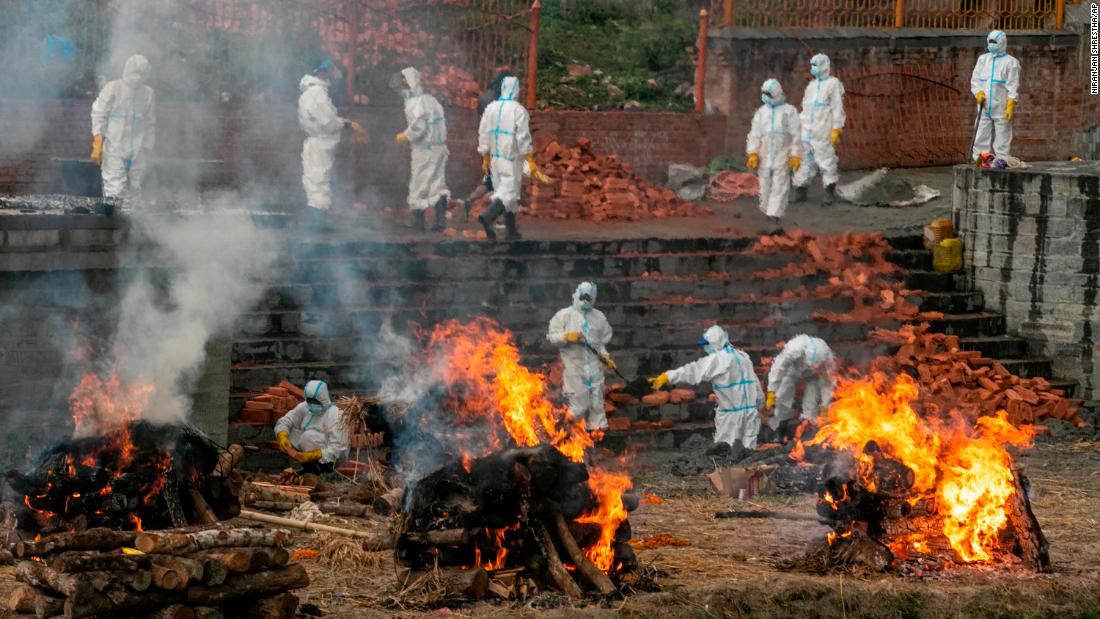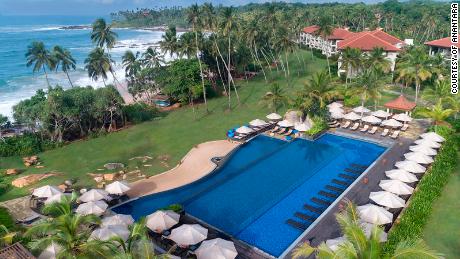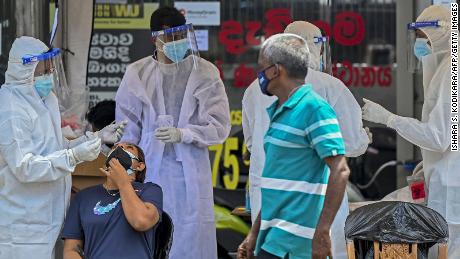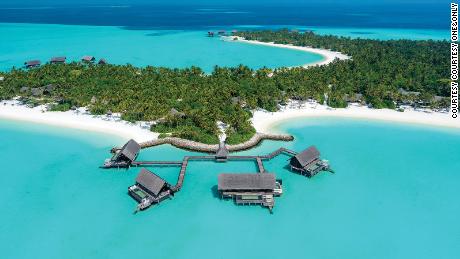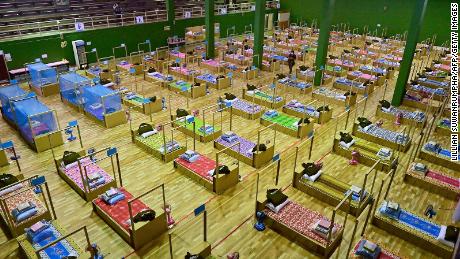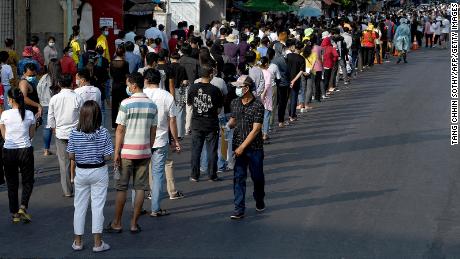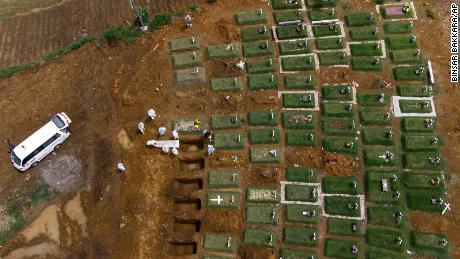Six countries around India are seeing cases skyrocket as the virus puts pressure on their health systems
“The Southeast Asia region reported over 2.7 million new cases and over 25,000 new deaths, a 19% and a 48% increase respectively compared to the previous week,” the WHO said on Wednesday. “India is currently driving the vast majority of this upward trend.”
The rapid resurgence of the virus has placed enormous pressure on the health systems and medical supplies of these countries. Some have called for international assistance amid the deepening crisis.
On Wednesday, the International Federation of Red Cross and Red Crescent Societies (IFRC) warned more must be done to stop the tragedy unfolding across Asia.
“We need to act now and we need to act fast to have any hope of containing this human catastrophe,” Alexander Matheou, the IFRC’s Asia-Pacific regional director, said in a statement. “This virus has no respect for borders and these variants are running rampant across Asia.”
Sri Lanka
Sri Lanka has experienced a steep spike in coronavirus cases since mid-April, with infections quickly surpassing the peak of its previous wave in February.
According to the country’s Health Minister Pavithra Wanniarachchi, the uptick in infections was due to the large gatherings for Sri Lanka’s New Year on April 13 and 14, during which people crowded the streets to celebrate and shop.
Before the event, authorities seemed confident Covid-19 was under control, and encouraged the public to celebrate while adhering to health guidelines.
“It is my hope and expectation that all citizens without any discrimination will join the Sinhala and Tamil New Year celebrations with fresh hopes, determination, and righteous thoughts,” he wrote.
But the restrictions failed to flatten the rising caseload. On Wednesday, Sri Lanka expanded its lockdowns to four more districts. As of now, lockdowns have been imposed in 13 of the country’s 25 administrative regions.
Instead, the rapid increase in cases is blamed on the highly contagious variant B.1.1.7, which was first detected in the United Kingdom and is circulating in Sri Lanka, Jeewandara said.
Last week, President Rajapaksa said the only answer the spiraling outbreak is vaccination. But Sri Lanka is facing a shortage of 600,000 doses of the AstraZeneca vaccine it ordered from the Serum Institute of India to complete the second round of its inoculation program.
So far, only a million vaccines doses have been administered in the country of 21 million — about five doses per 100 people. The rollout is slower than that of India, which has administered 12 doses per 100 people.
The Maldives
The Maldives, another neighbor of India, on Tuesday reported a daily record of 601 new Covid-19 cases, according to the country’s Health Protection Agency.
With its economy depending heavily on tourism, the Indian Ocean archipelago reopened its borders to international travelers last July after three months of lockdown, becoming the first country to welcome foreign tourists in the middle of the pandemic.
For now, the country is focusing on containing the virus among its own population — especially in the densely populated Greater Malé Region.
On Monday, the country’s Health Emergency Operation Centre warned the number of Covid-19 hospitalizations had tripled over the previous few days, and a new variant of the coronavirus may have entered in the Maldives.
Nepal
In Nepal, the situation is increasingly resembling the crisis in India, with skyrocketing infections, overwhelmed hospitals and pleas for help from other nations.
The country is now reporting about 20 daily Covid-19 cases per 100,000 people — about the same rate that India was reporting two weeks ago.
“What is happening in India right now is a horrifying preview of Nepal’s future if we cannot contain this latest Covid surge that is claiming more lives by the minute,” Nepal’s Red Cross chairperson, Dr. Netra Prasad Timsina, said in a statement.
Nepal has fewer doctors per capita than India, and a lower vaccination rate than its southern neighbor.
Mass public events, including festivals, political gatherings and weddings, have allowed infections to spread, along with general public complacency and slow government action.
“The situations are worsening day by day and it may go out of control in future,” Dr. Samir Adhikari, a spokesperson for Nepal’s Ministry of Health and Population, said Monday.
Some have blamed Nepal’s rapid surge in infections on the spillover effect from India. The two countries share a long, porous border. In recent weeks, some Indians have fled their country’s second wave, hoping to access health care in Nepal or escape to a third country, Adhikari said.
Thailand
Despite being the first country to report a Covid-19 case outside of China in January last year, Thailand kept its infection numbers low in 2020 thanks to successful containment measures.
This year, however, it is facing a much bigger challenge. After containing a second wave that started last December, Thailand is struggling to curb a third wave of infections that has pushed daily caseloads and death tolls to unprecedented levels.
Before the start of the latest wave, Thailand had reported 28,863 cases by March 31. In five weeks, that number has more than doubled to surpass 76,000. On Friday alone, it reported 1,911 new cases.
Wayo Assawarungruang, an opposition member of parliament who oversees his party’s public health policy, said some hospitals in Bangkok had denied patients coronavirus tests because they didn’t have enough beds available and were required by the government to immediately admit positive patients.
Cambodia
Cases are also surging in Cambodia, which until February had recorded one of the world’s smallest coronavirus tallies and no fatalities.
“Despite our best efforts, we are struggling to control the virus,” said WHO Representative to Cambodia Li Ailan. “Unless we can stop the outbreak, Cambodia’s health system is at high risk of being overwhelmed, which would have disastrous consequences.”
Li also warned the ongoing outbreak is different from last year due to the contagious UK variant, which has been detected in Cambodia.
On Monday, Hun Sen ordered the end of the Phnom Penh lockdown, despite surging cases.
Indonesia
Earlier this week, Indonesia’s Health Ministry confirmed two patients had the highly infectious coronavirus variant B.1.617, that was first identified in India. The country of 270 million has recorded a daily average of about 5,000 Covid-19 cases in the past week.
Authorities are concerned about the impact of the upcoming Mudik holiday, in which tens of millions of people travel to see their families in their hometowns to celebrate Eid al-Fitr, the end of Ramadan.
To halt the spread of Covid-19 during Eid festivities, the Indonesian government has banned all domestic travel from May 6 to May 17. The ban covers public and private journeys, including using cars, motorcycles, buses, trains, ferries, ships and planes.
About 155,000 personnel including 90,000 police and 11,500 military officers are being deployed to posts around the country to enforce the ban and restrictions around the holidays, Antara reported Wednesday. In Jakarta, more than 4,000 personnel will be stationed around the metropolitan region to enforce rules.
Additional reporting by CNN’s Julia Hollingsworth, Helen Regan, Kocha Olarn, Iqbal Athas, Sugam Pokharel, Masrur Jamaluddin and Reuters.
![]()


